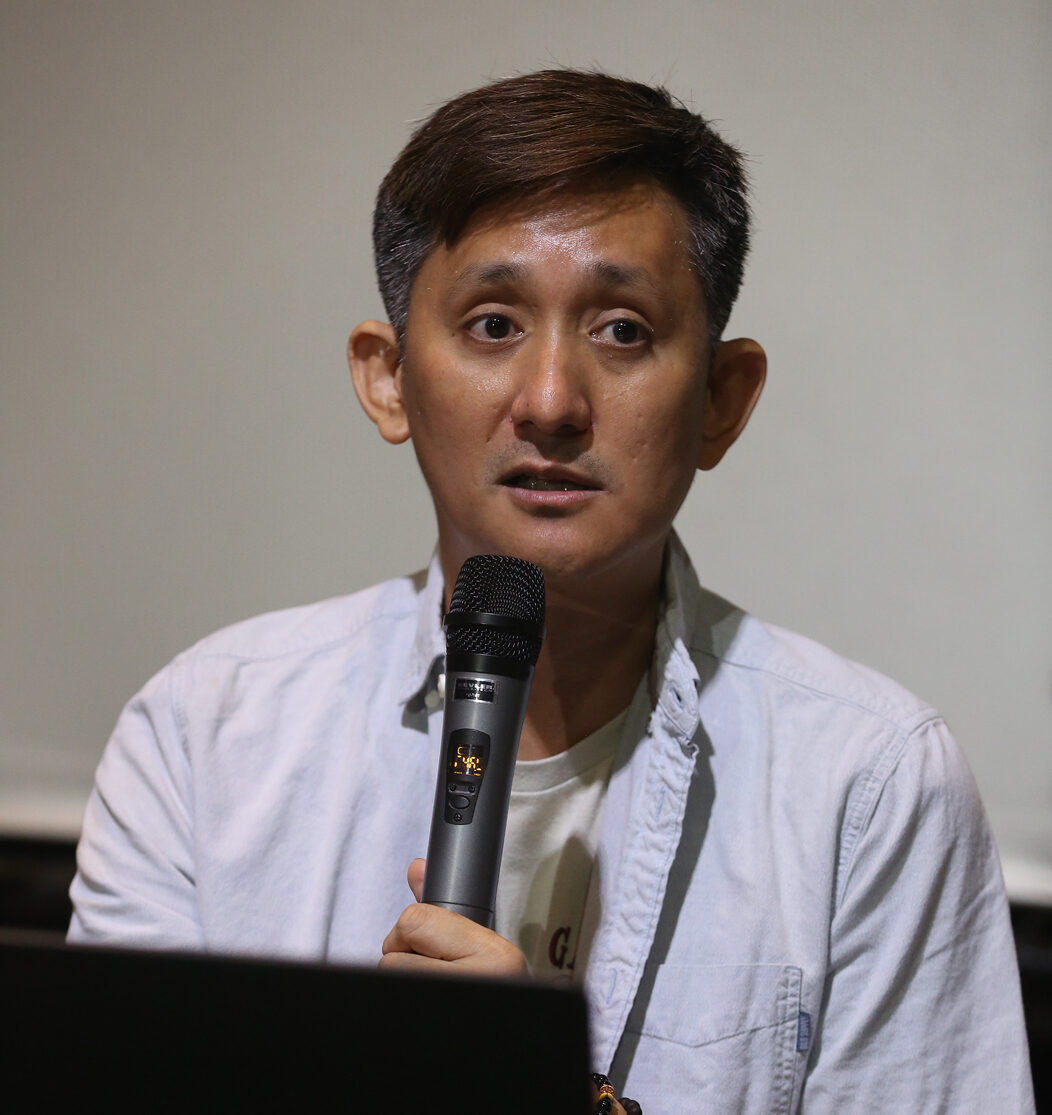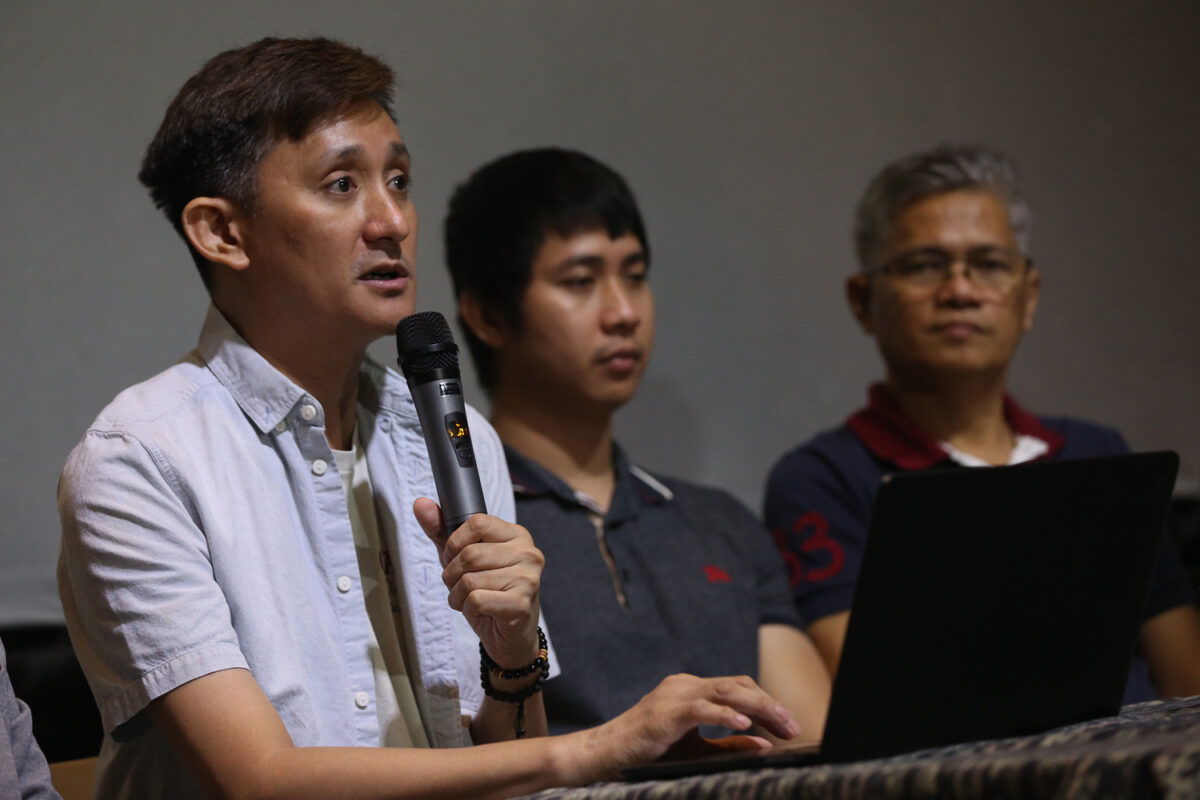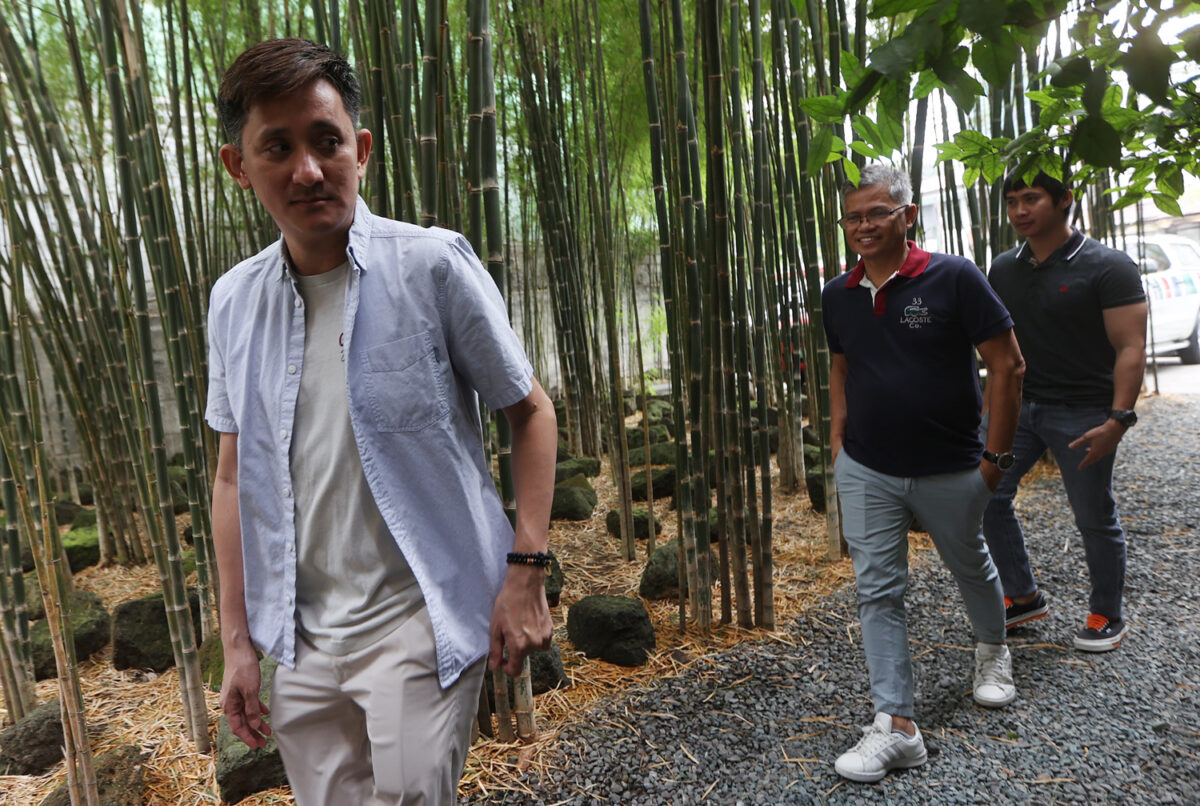Jade Castro on his 40-day incarceration: We chose to make it livable

Film director and screenwriter Jade Castro —PHOTOS BY NIÑO JESUS ORBETA
I never thought of this as a tragedy. I’ve always believed in happy endings,” said filmmaker Jade Castro, who faced the media on Monday afternoon after 40 days of incarceration in relation to charges of disruptive arson filed against him and three others in Catanauan, Quezon.
“To me, it’s just [part of life’s] struggles and conflicts, and that, eventually, we will win over it,” Jade told reporters during the media gathering that was also attended by his companions, civil engineers Noel Mariano and Dominic Valerio Ramos, lawyers Mike Marpuri and Carmela Pena, and lawyer Chel Diokno, who is chair of the Free Legal Assistance Program. Fellow detainee, sales manager Ernesto Orcine, was not present at the event.
The four were arrested without a warrant on Feb. 1 in Mulanay, Quezon, after authorities said witnesses identified them as the men who torched a modern jeepney in another town. A week later, prosecutors found probable cause to pursue arson charges against them. They were released on March 12 after a court found that the arrest was “illegal,” based on an “absence of reasonable connections” between initial witness statements and a police report on the incident. “The four of us love to travel. Noel and I have been friends for 25 years, while Dom and I have known each other for three years, but we’ve already traveled to a lot of places together. It was Ernest and I who have always wanted to go to Mulanay, since we saw Gil Portes’ 1996 movie with Jaclyn Jose,” Jade began.

Castro (left) appears with Dominic Ramos and Noel Mariano
Support and love
“We all enjoy going to festivals. That’s how we became travel buddies. In our trips, a lot of it was just winging it. We would look for a good place to eat or hang out. Noel and I like watching pageants. In Mulanay, we also watched a kalamay cooking contest and a street parade,” he said. “We’re very adventurous. A year before Mulanay, we went white water rafting in Cagayan de Oro and toured Bukidnon.”
When asked to comment on the support given to him by fellow artists and film workers, Jade said: “I didn’t expect to feel so much love from them. I don’t want to say it, but I’m surprised that I’m actually famous,” he said, laughing.
Article continues after this advertisement“When we got arrested, there was an inquest, so we had some down time. I got my cell phone to search if there was any news on Catanauan. I saw that dzRH posted about what happened to us. That’s when I posted on X that we were innocent. Hours later, people started expressing support, love and even admiration. It actually made me feel good thinking that a lot of people are connected.”
Article continues after this advertisement
Castro (left) appears before the media with Mariano and Ramos.
Freedom and truth
He said he couldn’t help but cry the first time he learned that organizations like Dakila and the Directors’ Guild of the Philippines, which he’s both a member of, had issued statements related to his arrest. “I’m thankful that people saw themselves in what happened to me, that I was indeed part of one community, and that everyone wants to join the fight for freedom and for knowing the truth.”
Jade directed the award-winning films “Endo” and “Zombadings: Patayin sa Shokot si Remington.” He is also credited with “My Big Love,” “My Kontrabida Girl,” “My Lady Boss,” “Beki Boxer” and “LSS (Last Song Syndrome).”
The director said he has several projects that unfortunately got stalled. “I’m glad all of them said they would wait for me,” said Jade, who was commissioned to edit Erik Matti’s “Call My Manager,” starring Judy Ann Santos and Edu Manzano. This is set to stream on HBO Go.
READ: Erik Matti appeals for financial help for filmmaker Jade Castro
He is also producing Petersen Vargas’ “Some Nights I Feel Like Walking.” “We were supposed to go to Taiwan to do the sound mixing,” Jade said. The film, which is a coproduction of Singapore, Taiwan and the Philippines, stars Tommy Alejandrino, Gold Azeron, Arjel Saycon and Jomari Angeles.
‘Mixed emotions’
What was the last 40 days like? “I had mixed emotions,” said Jade. “But a lot of it was the hope that we would be able to come out sooner. More than the fact that we had a lot of support, we believed that the truth will come out. We helped each other make the 40 days feel livable. We played board games that were sent to us by friends.”
To cope, Noel said they simply turned prison into their home. “I actually made some friends there. I just didn’t get tattoos,” he said, laughing. “Spending time there made us feel like we’re just ordinary people. While we live a good life outside, inside, we learned to adjust. We learned to cook, clean toilets and do things to cater to the whims of authorities. The experience taught me to be humble.”
Patience
Dom said this taught him patience. “If you’re impatient, [then incarceration] will drive you crazy. We got arrested on Feb. 1, which is also my mother’s 60th birthday. I had hoped that my family would not find out what happened to me until we got freed, but I later discovered that the police went to our home in Nueva Ecija to ask my parents to confirm my identity,” he recalled.
“At the time, my mother just had her cataract operation. I was worried that she would cry when she learned about what happened to me and this would damage her eyes. I got really angry with the police. I even had an argument with one, but I had to really calm myself, believe in due process, and trust in the words of our lawyers that we would be able to come out eventually,” Dom said.
Jade said he discovered two things about himself. “First, that I was actually brave. On our first day, I fiercely argued with a police officer. I kept repeating, ‘We’re not surrendering to an arrest.’ That’s what a friend advised me through text. So on the first night, we didn’t sleep [in our prison cell] but in the office,” he began.
“Second, I learned how to pray. We would get visits from priests and pastors. Whenever my family visited me, we would end it with a prayer. I got in touch with this particular side of me again. I’ve been friends with Noel for a long time, but it was the first time I saw Noel make a confession.”